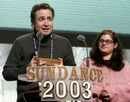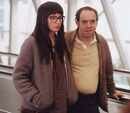January 25, 2003 -- From Reuters
'American Splendor,' 'Friedmans' Sundance Winners
Saturday, January 25, 2003, 10:33 PM ET
By Bob Tourtellotte
PARK CITY, Utah (Reuters) - Film drama "American Splendor" and documentary "Capturing the Friedmans" won top awards at the Sundance Film Festival on Saturday as the United States' premier event for independent film reached its climax.
"American Splendor" tells of the everyday life of comic artist Harvey Pekar and his relationship with Joyce Brabner, who is just as depressed and co-dependent as he, but somehow the pair seem to make it through life, together.
The way the movie's directors blended film footage with videotape of the real Pekar and animation to tell their story has wowed audiences here and, along with the poignant story, helped it earn the Grand Jury Prize for best drama.
"Capturing the Friedmans" took the Grand Jury Prize for best documentary with its recounting of what happens to an upper middle class family when the father and son are arrested.
Much the same way "American Splendor" blended different types of footage, "Capturing the Friedmans" used not only the documentarians' film, but mixed in the Friedman family's own home videos as they went through their experience.
DRAMAS AND DOCUMENTARIES
The Grand Jury Prizes are the Sundance's major honors and are voted upon in two categories -- dramas and documentaries -- by a jury of five filmmakers and actors in each group.
Sundance also allows audiences to pick their favorite films among the 16 competitors in each category, and audience awards went to "The Station Agent" in the drama group and "My Flesh and Blood" in the documentary category.
"Station Agent," a quirky drama about a lonely dwarf who moves into a small town's abandoned train depot and is befriended two other loners, also earned writer Tom McCarthy the Waldo Salt Screenwriting Award.
"My Flesh and Blood," which chronicles the lives of 11 special-needs children and the woman who cares for them, also claimed the Grand Jury Prize for directing for Jonathan Karsh.
The Grand Jury Prize for directing in the drama group went to Catherine Hardwicke for "Thirteen," about an adolescent girl whose friendship with another girl leads her down a self-destructive path of drug use and sexual experimentation.
Festival juries gave a trophy for excellence in cinematography to Dana Kupper, Gordon Quinn and Peter Gilbert for documentary, "Stevie," and to Derek Cianfrance for film drama "Quattro Noza."
Among international competitors, festival goers bestowed the World Cinema Audience Award on "Whale Rider," about a girl's coming-of-age and her efforts to take her place as the leader of a male-dominated tribal village in New Zealand.
Sundance gave its Freedom of Expression Award for a documentary that educates audiences on a social issue, to "What I Want My Words To Do To You," about a group of female prison inmates working through their problems in a writing workshop.
Patricia Clarkson was given a jury prize for acting for roles in three movies, "Station Agent," "Pieces of April," and "All the Real Girls, and Charles Busch was also handed a jury prize for acting in "Die Mommy Die."
Finally, Sundance awarded its jury prize for a short film to "Terminal Bar."
The Sundance Film Festival, held in this mountain town east of Salt Lake City ends on Sunday, Jan. 26.
January 25, 2003 -- From The Sundance Institute
2003 SUNDANCE FILM FESTIVAL ANNOUNCES AWARD WINNERS FOR IMMEDIATE RELEASE
The Sundance Film Festival is proud to announce the winners of the Independent Feature Film Competition for the 2003 Sundance Film Festival in Park City, Utah (January 16 - 26).
The Documentary Grand Jury Prize was given to CAPTURING THE FRIEDMANS, directed by Andrew Jarecki and produced by Andrew Jarecki and Marc Smerling. The Dramatic Grand Jury Prize was presented to AMERICAN SPLENDOR, directed by Shari Springer Berman and Robert Pulcini and produced by Ted Hope.
| Photos | |
 |
Directors Robert Pulcini and Shari Springer Berman pose with the dramatic grand jury prize they won at the Sundance Film Festival for their film "American Splendor," during the awards ceremony at the festival in Park City, Utah, January 25, 2003. REUTERS/Fred Prouser - Jan 25 1:18 AM ET |
 |
Directors Robert Pulcini and Shari Springer Berman accept the dramatic grand jury prize at the Sundance Film Festival for their film "American Splendor," during the awards ceremony at the festival in Park City, Utah January 25, 2003. REUTERS/Fred Prouser - Jan 25 1:06 AM ET |
 |
Scottish actress Tilda Swinton announces the winner of the dramatic grand jury prize at the Sundance Film Festival during the awards ceremony in Park City, Utah, January 25, 2003. The film "American Splendor," directed by Robert Pulcini and Shari Springer, was named the winner. REUTERS/Fred Prouser - Jan 25 1:29 AM ET |
 |
Actress Hope Davis and co-star Paul Giamatti , stars of the film "American Splendor" which won the dramatic grand jury prize at the Sundance Film Festival January 25, 2003, are pictured in a scene from the film in this undated publicity photograph. REUTERS/Sundance Film Festival/Handout - Jan 26 3:46 AM ET |
 |
Hope Davis appears in a scene in the 2002 film "American Splendor" that premiered during the January 2003 Sundance Film Festival in Park City, Utah. |
 |
Actress Hope Davis and co-star Paul Giamatti pose during a photo session in Park City, Utah, January 22, 2003 at the Sundance Film Festival. Davis and Giamatti star in the film "American Splendor," which is in competition at the festival. |
January 24, 2003 Free Video from MSNBC
January 23, 2003 -- From Reuters
'American' Beauty
American Splendor
Thursday, January 23, 2003, 06:28 AM ET
By Scott Foundas
PARK CITY (Variety) - What a sad, tender, wise and beautiful film co-director/co-screenwriters Shari Springer Berman and Robert Pulcini have made from Harvey Pekar's life and his "American Splendor" comics.
Like Terry Zwigoff's equally superb "Ghost World," this is a film about the kind of people most movies never bother about: the lonely, untrendy and frequently rage-filled masses. It's a profound tribute to lives lived on the fringes of society --to the introspective loners who are the most observant chroniclers of our times. Produced by HBO Films, but being shopped to theatrical distributors, pic deserves a bigscreen berth, where it will enjoy strong critical support and the embrace of a loyal cult audience.
"American Splendor" represents a bold deconstruction of the fatigued biopic form. Not content to present the Cleveland-based Pekar's life as anything resembling a straightforward narrative, Berman and Pulcini -- who have previously made only documentaries -- wildly jiggle around the raw materials of their film until they're left with a freewheeling phantasmagoria of dramatic scenes, documentary interviews (with the real Pekar) and crazily inspired animated bits drawn by the likes of R. Crumb and Joe Zabel. The result is a vibrant, untamed film that stubbornly refuses to fit into any prefigured category.
"American Splendor" begins in 1950 but freely jumps back and forth in time, allowing particular events to trigger memories -- the way Pekar himself might tell us his story over a burger at some roadside diner. (Indeed, the raspy-voiced Pekar narrates the film.) We see Pekar working his dead-end job as a file clerk in a VA hospital, having his fateful garage-sale meeting with Crumb (played by James Urbaniak in a magnificent bit of mimicry) and ultimately making his first efforts at comic-writing. In these scenes, Pekar is portrayed by the chameleonic character actor Paul Giamatti, who shifts, squints and squirms his way brilliantly through the performance -- a major breakthrough for an actor who has previously been so very good in so many forgettable films ("Duets," "Planet of the Apes"). By pic's end, Giamatti and Pekar are used interchangeably in a few scenes, and by that point, one has become indistinguishable from the other.
In strikingly unsentimental terms, Pulcini and Berman chart Pekar's tumultuous life and yearlong battle with cancer. But above all, the film is a bittersweet and delicately rendered love story about the ramshackle, picture-imperfect family Pekar assembles after years of loneliness and failed marriages -- comprising wife Joyce (an unrecognizable and thoroughly wonderful Hope Davis) and foster daughter Danielle (Madylin Sweeten) -- and how his comics inadvertently lead him to it.
In Pekar's own words, "ordinary life is pretty complex stuff," and his comics are filled with sly observations about ugly, commonplace disappointments. Likewise, the movie is so keyed to this sensibility that it seems to be trudging forward with its head bowed against an oncoming wind. It's a fundamentally surrealist piece, one that eschews objectifying Pekar's life in favor of a full immersion into his slightly exaggerated worldview, so that we may better understand how Pekar was able to take life's lemons and transform them into lemon-art. Thus freed, American Splendor" becomes a celebration -- an advocacy, even -- of finding the "art" in one's own life.
Gifted cinematographer Terry Stacey ("Wendigo") shoots in tight closeups and two-shots at dynamic angles, evoking the graphic intensity of the comicbook form, while Therese DePrez's vintage production designs and Michael Wilkinson's gloriously secondhand costumes work in sublime tandem to evoke the industrial-chic Cleveland landscape in all its earth-toned glory. Pic's orchestration delivers nary a false note.
Late in the film, Pekar recounts the conundrum of once discoveringhe was not the only Harvey Pekar in the Cleveland phone book: "What's in a name?" he laments; "Who is Harvey Pekar?" "American Splendor" (the comic and the movie) is the answer to that question. And getting to know Harvey Pekar in all his paranoia and anger and bad hygiene is a distinct pleasure.
Harvey Pekar ............. Paul Giamatti
Real Harvey .............. Harvey Pekar
Interviewer .............. Shari Springer Berman
Mr. Boats ................ Earl Billings
Robert Crumb ............. James Urbaniak
Toby Radloff ............. Judah Friedlander
Bob the Director ......... Robert Pulcini
Real Toby ................ Toby Radloff
Joyce Brabner ............ Hope Davis
Real Joyce ............... Joyce Brabner
Stage Actor Harvey ....... Donal Logue
Stage Actor Joyce ........ Molly Shannon
Fred ..................... James McCaffrey
Danielle ................. Madylin Sweeten
Real Danielle ............ Danielle Batone
An HBO Films presentation of a Good Machine production. Produced by Ted Hope.
Directed, written by Shari Springer Berman, Robert Pulcini, based on the "American Splendor" comics by Harvey Pekar and "Our Cancer Year" by Pekar and Joyce Brabner. Camera (Deluxe color), Terry Stacey; editor, Robert Pulcini; music, Mark Suozzo; music supervisor, Linda Cohen; production designer, Therese DePrez; set decorator, Robert Desue; costume designer, Michael Wilkinson; sound (Dolby Digital), Whit Norris; supervising sound editor, Nicholas Renbeck; animation and visual effects, Twinkle; associate producer, Julia King; assistant director, Chip Signore; casting, Ann Goulder. Reviewed at Sundance Film Festival (Dramatic Competition), Jan. 20, 2003.
January 22, 2003 --From Reuters-Variety
Women Addicted to 'Love' at Sundance
Wed January 22, 2003 02:11 AM ET
By Dana Harris and Cathy Dunkley
...Another television production that seems destined for the big screen is "American Splendor," an HBO Films production that premiered Monday night. Based on the underground comic book series of the same name, "American Splendor" is the true story of Harvey Pekar, an eccentric and self-described flunky file clerk who finds salvation and a measure of fame by documenting his life in comics illustrated by artists like Robert Crumb.
Written and directed by Robert Pulcini and Shari Springer Berman ("Off the Menu: The Last Days of Chasen's"), the film stars Paul Giamatti and Hope Davis and combines biopic, animation and documentary techniques.
The film also includes interviews with Pekar and his wife, Joyce Brabner, who were the guests of honor at an HBO-hosted dinner held at Main Street's Wahso following the premiere. As the evening came to a close around 1 a.m. Tuesday, the voluble Pekar exhorted his wife to leave the party. ("The car's waiting, Joyce!") However, the self-possessed Brabner allowed fans to help her with her coat as she explained how she knew she was ready to marry him within hours of meeting.
"We had been corresponding for a long time, so I already knew we were well matched," she said. "I just needed to see him in person to make sure he didn't look like a Crumb drawing."
Among the fans of "American Splendor" is Newmarket Films, which has established a solid relationship with HBO thanks to its successful distribution of "Real Women Have Curves." However, no deal has been made...
Saturday, January 1, 2003 -- From Sundance Film Festival
Harvey Pekar works at the VA hospital in his hometown of Cleveland and fills his days with reading, writing, listening to jazz, and engaging in cerebral banter. When his buddy Robert Crumb earns wide acclaim for comic art, Harvey is inspired to write his own brand of comic books, and he makes the monotonous torture of his everyday foibles their focus. American Splendor is hugely successful, but Harvey still finds his life lacking. Enter the equally depressive Joyce Brabner, and united in codependence, the pair tackles life together. Filmmaker team Shari Springer Berman and Robert Pulcini blow up all rules of the biopic and find just the right cinematic voice for their subject. Using film, video, and animation, they ingeniously construct a structure in which images of the real-life Harvey are intercut with that of his onscreen persona, flawlessly recreated by Paul Giamatti. The result is seamless, effective and undeniably unique, and the animated sequences, like comics, add spunk and spontaneity. A film undertaking of this nature takes guts and skill, and this filmmaking team has both. As with Harvey's own creation, they have on their hand a truly one-of-a-kind creation.
--- John Cooper ---
| Date | Time | Venue |
| Mon, Jan 20 | 8:30pm | Park City Library Center |
| Tue, Jan 21 | 8:30am | Park City Library Center |
| Wed, Jan 22 | Noon | Eccles Theatre |
| Thu, Jan 23 | 4:00pm | Sundance Village |
| Fri, Jan 24 | 5:30pm | Park City Library Center |
December 15, 2002 -- American Splendor will have it's world premiere as one of sixteen dramatic films that were chosen to be shown at the Sundance Film Festival in January, 2003. There were over eight hundred submissions. It will be in competition.
It is based on the comic book series of Harvey Pekar, wherein he tells his true life story as a Cleveland Hospital file clerk and as a struggling writer.
The details of the movie's release have not been established but it will be in 2003.
